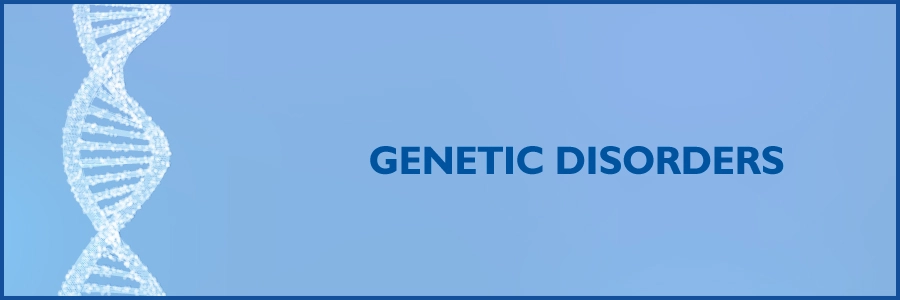- Cardiology 84
- Dermatology 45
- Endocrinology 33
- ENT 16
- Fertility 190
- Gastroenterology 78
- General-Medicine 81
- Gynecology 80
- Hematology 19
- Infectious-Diseases 33
- Neurology 52
- Oncology 34
- Ophthalmology 23
- Orthopedics 69
- Pediatrics 31
- Procedure 23
- Public-Health 144
- Pulmonology 59
- Radiology 8
- Urology 68
- Wellness 161
- Woman-and-child 77

What are Genetic Disorders?
A genetic disorder occurs when the genes are affected by a mutation (also known as a pathogenic variant), or there is not enough genetic material.
- Genes are made of DNA (deoxyribonucleic acid), which contains instructions for cells to function properly.
- Inheriting a gene mutation from one or both parents is possible, as you receive half of your genes from each biological parent.
- Genes can change due to problems with DNA (mutations). This increases your risk of developing genetic disorders.
- In some cases, symptoms develop at birth, while in others, they develop later in life.
Types of Genetic Disorders
Genetic disorders can be inherited or arise spontaneously. Learn about their impact and treatments.
Chromosomal
- In this case, it affects parts of the cell that house genes and DNA (chromosomes).
- People with these disorders lack or have duplicated chromosomal material.
Complex (Multifactorial)
- A combination of gene mutations and others causes these diseases.
- Chemical exposure, nutrition, some medications, and tobacco or alcohol usage are among them.
Single-gene (Monogenic)
- A single gene mutation causes this group of diseases.
What are Common Genetic Disorders Types?
There are three types of genetic disorders;
- Chromosomal disorders
- Multifactorial disorders
- Monogenic disorders
Chromosomal Disorders
- Klinefelter syndrome
- Down’s syndrome (Trisomy 21)
- FragileX syndrome
- Turner syndrome
- Triple-X syndrome
- Trisomy 13
- Trisomy 18
Multifactorial Disorders
- Arthritis
- Late-onset Alzheimer's disease
- Cancer
- Isolated congenital heart defects
- Coronary artery disease
- Diabetes
- Migraine headache
- Spina bifida
Monogenic Disorders
- Cystic fibrosis
- Duchenne muscular dystrophy
- Deafness(congenital)
- Hemochromatosis (iron overload)
- Familial hypercholesterolemia
- Sickle cell disease
- Tay-Sachs disease
- Neurofibromatosis type 1 (NF1)a
What Causes Genetic Disorders
Knowing more about genes and DNA might help you understand the causes of genetic disorders. Most of the DNA in the genes instructs the body to make proteins.
Activating these proteins initiates complex cell interactions, which are beneficial to our overall health. A mutation affects the instructions that the genes provide to make proteins.
There could be missing proteins, or the ones you have may not work properly. Environmental factors (also known as mutagens) can also cause a genetic mutation. These include:
- Smoking
- Chemical exposure
- Radiation exposure
- UV exposure from the sun
What is the Treatment for Genetic Disorders like?
Most genetic disorders are incurable. However, some diseases can be managed with treatments that can slow the growth of the condition or minimise its impact on people’s lives.
The type of treatment for genetic disorders that is appropriate for you is determined by the nature and severity of the disease.
- Medications to manage symptoms or to slow abnormal cell growth
- Dietary supplements or nutrition counselling
- Physical or speech therapy to improve your abilities
- Blood transfusion to restore healthy blood cell levels
- Surgery to treat complications or repair abnormal structures
- Specialised treatments, such as radiation therapy for cancer
- Organ transplant is a procedure that replaces a non-functioning organ with one from a healthy donor
Ready to take control of your health journey? Book your appointment now and start your path towards wellness today!
Book an AppointmentHow Can I Prevent a Genetic Disorder?
Genetic counselling and testing might help you understand more about the risks involved. It can also inform you whether your children are at risk of inheriting certain diseases.
Genetic disorders develop when a mutation affects the genes or chromosomes. Some disorders generate symptoms at birth, while others develop over time. Genetic testing can provide information about the chances of developing a genetic disorder.
If you or a loved one have the symptoms of a genetic condition, it is important to seek treatment from an expert specialist.
Citations
New Perspectives for the Elucidation of Genetic Disorders
An Overview of Mutation Detection Methods in Genetic Disorders
Frequently Asked Questions
Changes or mutations in genes cause genetic disorders.
Genetic testing can find out if someone has or might pass on a genetic disorder.
No, some happen without being inherited, due to new mutations.
Most genetic disorders cannot be cured, but treatments can help manage symptoms.
Doctors use tests like blood tests, genetic testing, and sometimes special imaging to diagnose genetic disorders.
Symptoms vary widely depending on the disorder, but can include physical problems, developmental delays, and learning difficulties.
Some genetic disorders are rare, while others, like Down syndrome, are more common.
Some genetic disorders can be detected early through genetic testing, but they cannot be completely prevented.

- Cardiology 2132
- Dermatology 168
- Endocrinology 135
- ENT 97
- Fertility 217
- Gastroenterology 232
- General 478
- General-Medicine 1685
- Gynecology 169
- Hematology 85
- Infectious-Diseases 208
- Neurology 207
- Oncology 345
- Ophthalmology 65
- Orthopedics 187
- Pediatrics 83
- Procedure 72
- Public-Health 209
- Pulmonology 126
- Radiology 13
- Second Opinion 311
- Urology 294
- Wellness 600
- Woman-and-child 447
- Others 10217
Related Blogs
If you have any questions, please fill out the enquiry form or call us, and we will get back to you promptly.
040-68334455